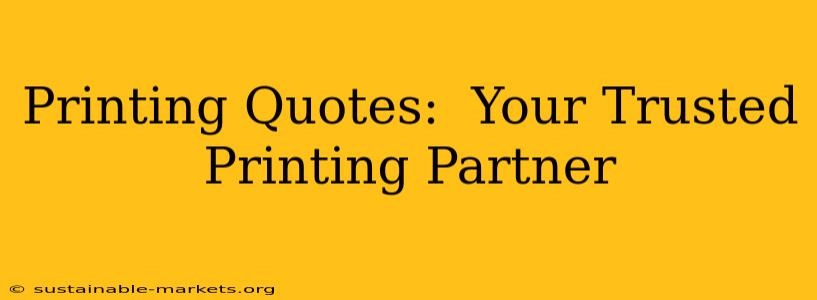Finding the right printing partner can be a challenge. Navigating different printing options, understanding pricing structures, and ensuring quality can feel overwhelming. This guide will help you understand the process of getting printing quotes and finding a trusted partner to meet your needs. We'll cover everything from preparing your files to understanding different print methods and negotiating the best price.
What information do I need to get an accurate printing quote?
This is often the first hurdle. To receive an accurate quote, you need to provide comprehensive information about your project. This includes:
- Project specifics: What are you printing? Brochures? Business cards? Flyers? Posters? The more detail you provide, the better the quote will be.
- Quantity: How many copies do you need? Price per unit usually decreases with higher quantities.
- Dimensions: What are the exact dimensions of your print materials? Include bleed if applicable.
- Paper type and weight: Specify the type of paper (e.g., gloss, matte, uncoated) and its weight (e.g., 80lb, 100lb). This significantly impacts the final cost.
- Color: Are you printing in full color, black and white, or using a specific color scheme (Pantone matching)?
- Finishing options: Do you require any finishing options like binding (saddle-stitch, perfect bound), lamination (gloss, matte), cutting, or folding?
- File type: What format are your files in (PDF, AI, PSD, etc.)? High-resolution files are crucial for quality printing.
Providing all this information upfront saves time and ensures you get a precise quote.
What are the different types of printing?
Understanding the various printing methods will help you make informed decisions. The most common types are:
- Offset printing: Ideal for large quantities, offering high-quality results at a lower cost per unit.
- Digital printing: Suitable for smaller print runs and quick turnaround times. Offers flexibility for personalized prints.
- Screen printing: A specialized method for printing on various materials like t-shirts and other textiles.
How much should I expect to pay for printing?
Pricing varies greatly depending on factors mentioned above. However, it's crucial to compare quotes from multiple printers. Don't solely focus on the lowest price; consider the quality of the print, the printer's reputation, and the level of customer service.
What are the key things to look for in a printing partner?
Choosing the right printing partner is vital for the success of your project. Look for these qualities:
- Experience and reputation: Check reviews and testimonials to gauge their reliability and expertise.
- Customer service: A responsive and helpful team can make a significant difference in the overall experience.
- Quality control: Ensure they have robust quality control measures in place to minimize errors.
- Turnaround time: Understand their production timelines to ensure they meet your deadlines.
- Pricing transparency: Make sure the quote is clear and comprehensive, with no hidden costs.
How can I save money on printing costs?
Several strategies can help you reduce printing costs:
- Order larger quantities: As mentioned earlier, the price per unit generally decreases with larger orders.
- Choose cost-effective paper: Opting for less expensive paper types can significantly impact the total cost.
- Simplify your design: Complex designs require more time and resources, increasing the cost. A simpler design can save money.
- Combine printing projects: If you have multiple projects, combining them into one order can often result in discounts.
What if I need help with design?
Many printing companies offer design services. If you lack design skills, consider working with a printer that can assist with the design process.
By carefully considering these factors and seeking multiple quotes, you can confidently select a trusted printing partner and obtain the best value for your money. Remember, clear communication and detailed preparation are key to a smooth and successful printing experience.

